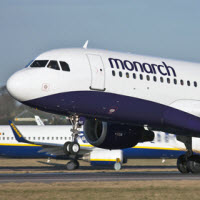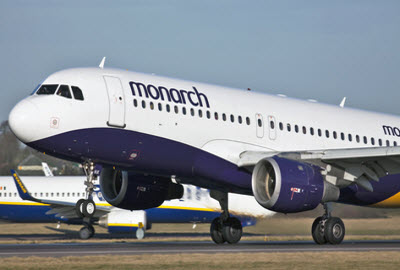Monarch Airlines And Passengers With Disabilities Yea or Nay?
- Written by Roberto Castiglioni
 Popular among British holidaymakers, Monarch has been the airline of choice for over 6.3 million passengers in 2012.
Popular among British holidaymakers, Monarch has been the airline of choice for over 6.3 million passengers in 2012.
Cabin comfort, a crucial factor for passengers with disabilities, is the number one complaint among the airline’s customers, according to comments posted on the established airline review website SkyTrax. Seat pitch is the technical term used by airlines, measuring the distance between the back of a seat from the back of the seat in front.
Other factors like thickness of seat padding, seat recline angle, and tray tables impact seating comfort. Newer aircraft are usually fitted with slimmer, better designed seats that allow more legroom even with low seat pitch.
UK safety regulations set the minimum seat pitch on commercial aircraft at 28 inches. The regulation relate to ensuring that passengers can sit upright in the seat and stand up and move to the aisle without undue difficulty.
Monarch airlines operate a relatively young fleet of aircraft, and recently confirmed the purchase of new ones
to be delivered in the coming years. Modern cabin interiors, providing better legroom and cabin comfort are the way forward in tackling the legroom issue.
Reduced Mobility Rights interviewed Russell Ison, Monarch Airlines Head of Communications, to review the airlines policy on carriage of passengers with disabilities.
Airlines have been limiting the number of passengers with reduced mobility on board any given flight for years. Only recently Ryanair changed its policy of maximum four passengers with reduced mobility per flight; German low cost carrier GermanWings still applies a limit of maximum five wheelchair passengers per flight.
"Monarch has no practical limit so long as passengers meet the criteria for “self-reliance” [being able to evacuate the aircraft unaided]", Russell Ison explained. "Our safety requirements state that the number of passengers with disabilities and other special categories (infants and children up to the age of 12 and pregnant women) cannot exceed the number of able bodied passengers."
Studies of the Federal Aviation Administration concluded that, with the exception of emergency exists, passengers with disabilities can be seated anywhere inside the aircraft cabin. However, for practical reasons like proximity to the lavatory or the aircraft door, airlines usually block certain rows of seats to accommodate disabled guests.
"We do have specific seat rows recommended for passengers with reduced mobility, usually row 2 and 3 and the last two  rows at the rear of the cabin," Russell said. "However as it is possible for all passengers to pay to pre-book any seat on Monarch scheduled flights it is not always possible to allocate these seats to disabled passengers as they may not always be available.”
rows at the rear of the cabin," Russell said. "However as it is possible for all passengers to pay to pre-book any seat on Monarch scheduled flights it is not always possible to allocate these seats to disabled passengers as they may not always be available.”
Airlines commonly waive seat booking fees for passengers with special needs, and Monarch is no exception to the rule. “Where there is a medical requirement to be allocated a legroom seat or one closer to the front of the aircraft for easier access to toilets we will absolutely waive the extra legroom pre-booking fee,” Russell explained. “This is usually upon provision of some form of proof of the medical requirement for additional room. For regular travellers with chronic rather than acute conditions we are happy to hold this proof on file for future travel bookings.”
Availability of an on-board wheelchair is of the essence for passengers with reduced mobility who are allocated seats not in proximity of lavatories. Passengers who think they may make use of such facility in-flight should tell the airline at time of booking. “Aisle chairs are not routinely carried on Monarch aircraft; however they are available to pre-book on any Monarch flight (subject to availability). They are carried out to the aircraft by the cabin crew as required. It’s useful to note that we only have a limited supply of aisle chairs at each UK base.” Russell said.
One final element that can improve cabin comfort for passengers with reduced mobility is the availability of
movable armrests. "I acknowledge passengers with severely reduced mobility (WCHC) seated in rows with non-movable aisle seat armrests might encounter some difficulties being lifted into the seat" Russell said. "Monarch operates a complex fleet of aircraft and all not all aircraft interior configurations are the same so it is impossible to guarantee the availability of movable armrests."
Monarch is one of the two UK airlines offering TravelChair to its young passengers with disabilities. suitable for children between the age of three and 11 year old, TravelChair features adjustable headrest, footrest and body harness providing various levels of postural support. This service is offered free of charge and must be pre-booked through Monarch customer services team.
Special assistance can be booked via the Monarch website at the time of booking; alternatively, passengers with special needs are invited to contact the airline via email (free of charge) or by phone (calls from a landline are charged 10p per minute).
Do you require assistance when traveling by air? Have you recently flown Monarch? Have your say.
About the author
Founder and Editor-in-Chief of Reduced Mobility Rights, Roberto Castiglioni is an expert of airport accessibility, management and support procedures of passengers with special needs and air travel related regulations. He has been a frequent flyer for the past three decades and has several years of experience as travelling partner of a passenger who requires assistance.
Roberto provides accessibility and access consulting services to airports and airlines. He is a member of the UK Civil Aviation Authority Access To Air Travel Working Group. He is also a member of the Easyjet Special Assistance Advisory Group. Esaag provides Easyjet with strategic guidance and practical advice on the evolving needs of passengers requiring special assistance.










